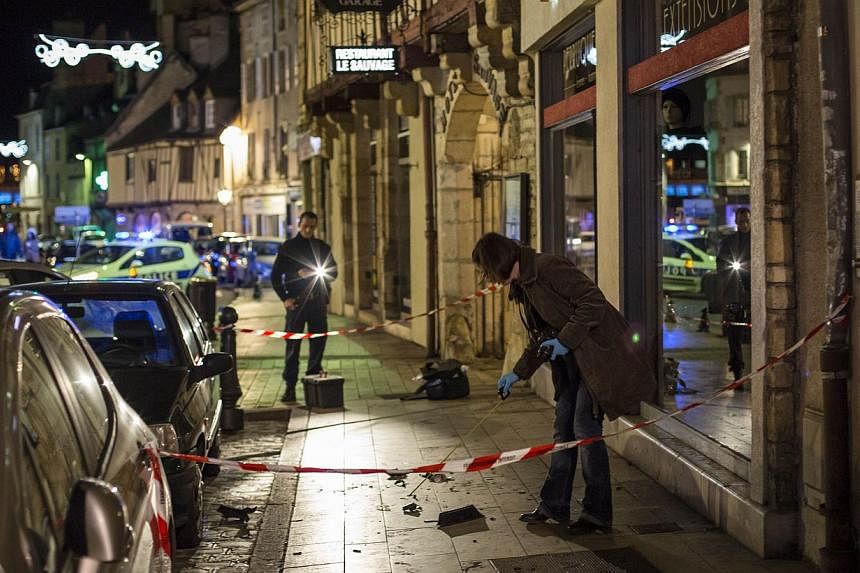DIJON, France (AFP) - A Frenchman who ploughed into pedestrians shouting "Allahu Akbar" had been to psychiatric hospital 157 times and had no known links to terrorist groups, a prosecutor said on Monday, easing concerns that the attack was inspired by Islamic extremism.
The incident on Sunday in the eastern town of Dijon left 13 people hurt in a scene that one witness described as "apocalyptic" and came a day after a man assaulted police in the central town of Joue-les-Tours with a knife, slashing one officer in the face.
That man, who was shot dead, had also reportedly shouted "Allahu Akbar" - an Islamic phrase meaning "God is great" that has previously been used by extremists when waging violent attacks - prompting speculation that both assaults were motivated by radical Islamism.
But French leaders were quick to rule out any links between the two incidents, with President Francois Hollande urging the French not to panic and government spokesman Stephane Le Foll warning against "lumping them together".
In Saturday's attack, Bertrand Nzohabonayo, a Burundian convert to Islam, was shot dead after entering a police station in Joue-les-Tours armed with a knife, seriously wounding two officers and hurting another.
The assault prompted the government to step up security at police and fire stations nationwide.
Nzohabonayo, a legal resident in France, had previously committed petty offences but was not on a domestic intelligence watch-list although his brother, Brice, is known for his radical views and once pondered going to Syria.
Brice was arrested in Burundi soon after the Saturday incident, intelligence services there said on Monday.
Nzohabonayo's mother had told authorities in August last year that she was worried about Brice's radicalisation and "the influence he could have on his brother Bertrand", Paris prosecutor Francois Molins said.
His sister was also detained Saturday in Joue-les-Tours, but she will be released as there are no elements suggesting her complicity, he added.
The anti-terror branch of Mr Molins' office has taken over a probe into the attack amid heightened vigilance over potential "lone wolf" attacks by individuals heeding calls for violence by ISIS (Islamic State in Iraq and Syria) group.
The radical group has repeatedly singled out France for such attacks, most recently in a video posted on extremist sites.
Prime Minister Manuel Valls said Monday that more than 1,000 nationals were involved in one way or another with jihad in Syria or Iraq, some at home and others - more than 300 - in both countries, of whom 56 or 57 have since died.
"We have never known such serious danger where terrorism is concerned," he said on a visit to the southern city of Montpellier.
Bertrand Nzohabonayo, who took the name Bilal when he converted to Islam, had posted a flag of the Islamic State group on his Facebook page Thursday, although people who knew him said at the weekend they refused to believe the attack was spurred by radical Islamism.
The assailant in the second attack on Sunday also shouted "Allahu Akbar", witnesses told police.
The driver targeted groups of passers-by at five different locations in Dijon in a rampage that lasted around half an hour before being arrested.
Interior Minister Bernard Cazeneuve, who visited the town on Monday, said 13 people were injured though none of the victims are in critical condition.
Local prosecutor Marie-Christine Tarrare told reporters that the driver, 40, had a "long-lasting and severe psychological disorder" and had visited psychiatric hospital 157 times.
She said he told police that he ploughed into people due to a sudden "outburst of empathy for the children of Chechnya" and had shouted "Allahu Akbar" to give him courage.
"He was not guided by religion but because he felt that politically he had to react," she said, adding that nothing had been found at his parents' home that would suggest he had any interest in the Islamic State group or other extremist movements.
A witness to his rampage, meanwhile, described an "apocalyptic scene".
"We were going home, we saw four people on the ground... who weren't moving at all," said the witness, who refused to be named.
"Cars stopped to give them first aid. Very quickly, firefighters and emergency medical workers arrived."

